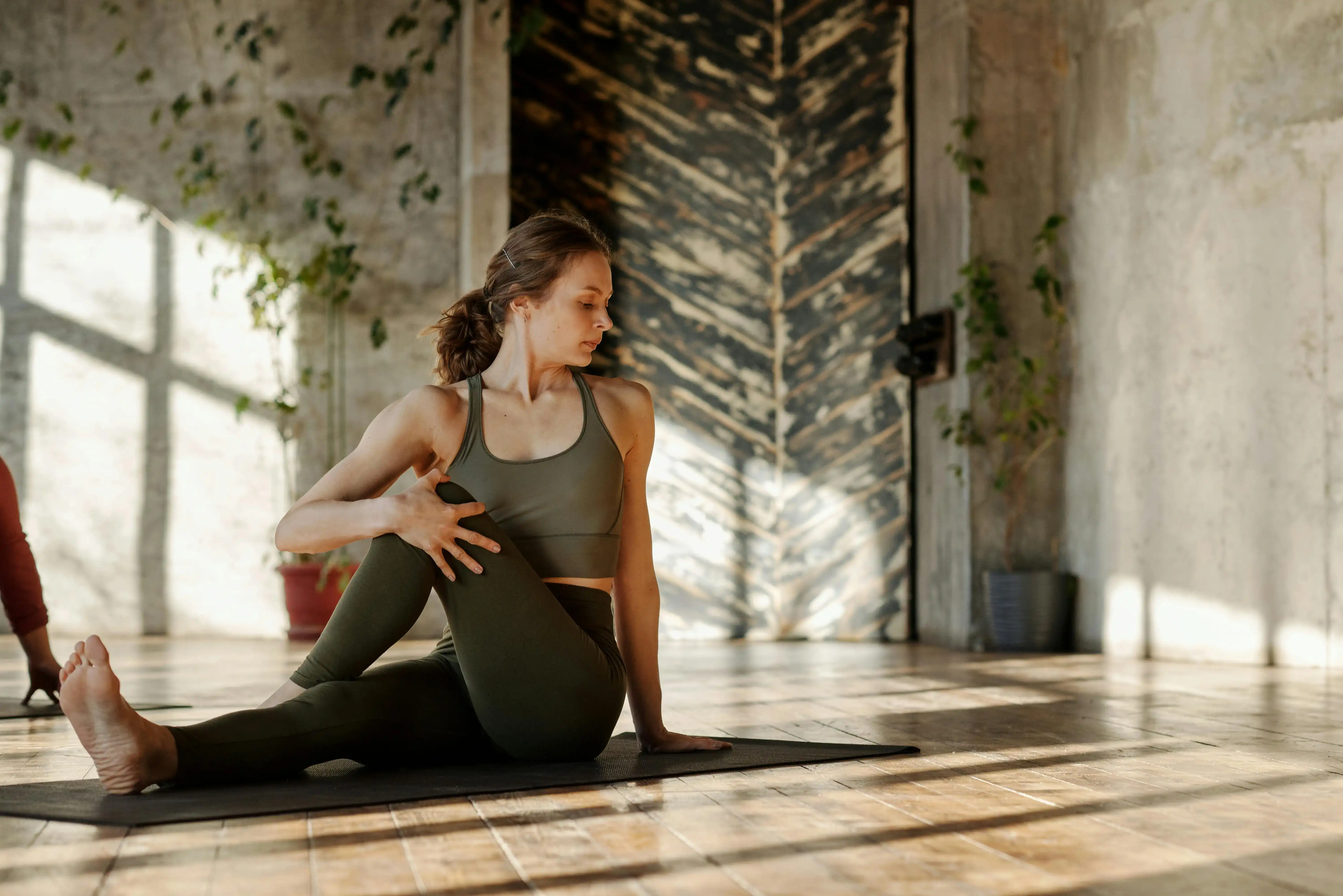Healthy Lifestyle Habits: Nutrition, Exercise, and Sleep for Optimal Well-being
Emily Willis

Photo: Healthy Lifestyle Habits: Nutrition, Exercise, and Sleep for Optimal Well-being
Imagine feeling energized, focused, and ready to tackle the day. It's a fantastic feeling, and it's within reach for everyone. The key lies in cultivating healthy lifestyle habits that nourish your body and mind. This article dives into three pillars of well-being: nutrition, exercise, and sleep. By incorporating these practices into your daily routine, you can unlock a world of increased energy, improved mood, and a stronger foundation for overall health.
Nutrition: Eating for Energy and Vitality
Food is more than just fuel; it's a source of information that directly impacts your body's functions. Choosing the right foods can significantly improve your physical and mental well-being. Here are some key aspects of a healthy diet:
- Variety is Key: Fill your plate with a rainbow of fruits and vegetables. These colorful powerhouses are packed with essential vitamins, minerals, and antioxidants that keep your body running smoothly.
- Whole Grains are Your Friends: Opt for whole grains like brown rice, quinoa, and whole-wheat bread over refined grains like white bread or pasta. Whole grains provide sustained energy and dietary fiber, which keeps you feeling fuller for longer.
- Lean Protein Power: Include lean protein sources in your diet, such as fish, chicken, beans, and lentils. Protein is essential for building and repairing tissues, keeping you feeling satisfied, and supporting healthy brain function.
- Healthy Fats are Good Fats: Don't shy away from healthy fats like those found in avocados, nuts, seeds, and olive oil. These fats are crucial for hormone regulation, cell health, and keeping you feeling full.
- Limit Processed Foods: Processed foods are often loaded with unhealthy fats, added sugars, and sodium. These can contribute to fatigue, inflammation, and a variety of health problems. Aim to cook more meals at home using fresh ingredients.
- Drink Up!: Water is essential for every bodily function. Aim to drink plenty of water throughout the day to stay hydrated, improve digestion, and support healthy skin.
Exercise: Moving Your Body for a Mood Boost
Physical activity isn't just about physical fitness; it's a powerful tool for boosting your mood, reducing stress, and improving cognitive function. Here's how to make exercise a part of your healthy lifestyle:
- Find What You Enjoy: The key to sticking with an exercise routine is finding activities you actually enjoy. Whether it's dancing, swimming, hiking, team sports, or simply going for a brisk walk, choose something you look forward to doing.
- Start Small and Build Up: Don't try to go from couch potato to marathon runner overnight. Start with manageable goals and gradually increase the duration and intensity of your workouts as your fitness improves.
- Aim for at Least 30 Minutes Most Days: The Centers for Disease Control and Prevention (CDC) recommends at least 150 minutes of moderate-intensity aerobic activity or 75 minutes of vigorous-intensity aerobic activity per week, spread out over several days. You can also combine moderate- and vigorous-intensity activities.
- Strength Training Matters: Incorporating strength training exercises that target all major muscle groups two to three times per week can significantly improve your overall health and fitness. Strength training builds muscle mass, which helps burn more calories throughout the day, even at rest.
- Move Your Body Throughout the Day: Even small changes can make a difference. Take the stairs instead of the elevator, park further away and walk, or do some stretches during your work breaks.
Sleep: The Ultimate Recharge for Body and Mind
Sleep is a non-negotiable for optimal health. During sleep, your body repairs itself, consolidates memories, and regulates hormones. When you're well-rested, you have more energy, better focus, and a more positive outlook. Here are some tips for getting a good night's sleep:
- Create a Relaxing Bedtime Routine: Wind down before bed with calming activities like taking a warm bath, reading a book, or practicing relaxation techniques. Avoid screens for at least an hour before bedtime, as the blue light emitted from electronic devices can interfere with sleep.
- Establish a Consistent Sleep Schedule: Go to bed and wake up at the same time each day, even on weekends. This helps regulate your body's natural sleep-wake cycle.
- Optimize Your Sleep Environment: Make sure your bedroom is dark, quiet, and cool. Invest in blackout curtains, an earplug set, and a comfortable mattress and pillows.
- Limit Caffeine and Alcohol: Avoid caffeine and alcohol close to bedtime, as they can disrupt sleep patterns.
- Regular Exercise Promotes Better Sleep: While intense exercise right before bed may have the opposite effect, regular physical activity throughout the day can significantly improve your sleep quality.
Building a Sustainable Healthy Lifestyle
Making significant changes to your lifestyle can seem daunting, but it's important to remember that it's a journey, not a race. Start small, focus on making gradual changes that you can maintain over time, and celebrate your progress along the way. Here are some tips for building a sustainable healthy lifestyle:
- Set Realistic Goals: Don't overwhelm yourself with trying to overhaul your entire lifestyle overnight. Instead, set small, achievable goals that you can build upon. For example, start by adding one serving of fruit or vegetables to your daily intake or committing to a 15-minute walk three times a week.
- Find Your Support System: Surround yourself with supportive people who encourage your healthy habits. Join a fitness class, find a workout buddy, or talk to your family and friends about your goals. Having a support system can make a big difference in staying motivated.
- Make it Enjoyable: Find activities that you genuinely enjoy, whether it's cooking healthy meals, exploring new hiking trails, or taking dance classes. When you associate positive emotions with your healthy habits, you're more likely to stick with them.
- Don't Be Afraid to Slip Up: Everyone has setbacks from time to time. Don't let a missed workout or an unhealthy indulgence derail your progress. Acknowledge it, learn from it, and get back on track.
- Track Your Progress: Keeping track of your progress can be a great motivator. Use a journal, fitness tracker, or app to monitor your goals, such as your daily steps, water intake, or healthy meals consumed. Seeing your progress can boost your confidence and keep you motivated.
- Reward Yourself: Celebrate your achievements along the way, no matter how small they may seem. Treat yourself to a massage, a new workout outfit, or a fun activity that you enjoy. Positive reinforcement can help you stay on track and make healthy habits a part of your lifestyle.
Remember, consistency is key to building a sustainable healthy lifestyle. By making small, gradual changes that you can maintain over time, you can set yourself up for long-term success and achieve optimal well-being.
Additional Tips:
- Seek professional guidance: If you have any underlying health conditions or concerns, consult with a healthcare professional or registered dietitian for personalized advice on creating a healthy lifestyle plan that suits your individual needs.
- Explore different resources: There are numerous resources available to help you on your journey towards a healthier lifestyle. Books, websites, apps, and support groups can provide valuable information, inspiration, and motivation.
- Be patient and kind to yourself: Creating a sustainable healthy lifestyle takes time and effort. Don't get discouraged if you don't see results immediately. Be patient with yourself, celebrate your progress, and enjoy the journey towards a healthier, happier you.
Latest ✨
View AllArtificial Intelligence (AI) has evolved rapidly from science fiction to reality, offering immense potential but also presenting significant ethical challenges.
Emily Willis
Virtual reality (VR) and augmented reality (AR) are transforming the entertainment industry by offering immersive experiences that blur the lines between the real and virtual worlds. VR completely transports users into computer-generated environments, while AR overlays digital elements onto the real world.
Emily Willis
In today's job market, academic qualifications alone are not enough for success. Employers value soft skills such as communication, leadership, and teamwork. Educational settings provide opportunities for students to develop these skills. Strong communication skills enable effective collaboration and understanding. Presentation and public speaking skills enhance professionalism and credibility. Leadership skills involve setting goals, making decisions, and inspiring others. Teamwork skills are important for building relationships and achieving shared goals. Developing these skills in an educational environment prepares individuals for successful careers by enhancing employability and job readiness. Soft skills development is an ongoing process that promotes continuous learning and growth. By emphasizing the importance of soft skills, educational institutions empower students to succeed in a complex and interconnected world.
Emily Willis
fostering a love of reading in early childhood and provides practical tips to achieve this. It emphasizes starting early, making reading fun and interactive, integrating reading into daily activities, and addressing challenges with reluctant readers.
Emily Willis
Business
View All
August 5, 2024
The Importance of Having Insurance to Protect Yourself and Your Assetsinsurance in protecting individuals and businesses from financial losses due to unforeseen events. It explains the different types of insurance available, such as health, life, auto, homeowners, renters, disability, and liability insurance, and their benefits.
Emily Willis

August 5, 2024
How to Create Engaging Content and Convert Visitors to Customerscreating engaging content to attract and retain customers in the digital age. It provides strategies for understanding the audience, setting content goals, creating high-quality content, using storytelling and emotional connection, and optimizing content for conversions. It also covers content formats and distribution, measuring and analyzing content performance, and building relationships with influencers and user-generated content.
Emily Willis

August 4, 2024
How to Build a Strong Brand Identity for Your BusinessBuilding a strong brand identity is essential for business success as it helps differentiate you in the market, connect with your audience, and build loyalty. Key steps include understanding your target audience, defining your mission and values, developing a unique selling proposition, creating a memorable brand name and logo, choosing brand colors and typography, crafting a brand voice and messaging, ensuring a consistent brand experience, leveraging visual content.
Emily Willis
Economy
View Allchallenges and opportunities presented by economic uncertainty and explores strategies that governments and businesses can implement to mitigate risks, ensure stability, and pave the way for future success.
Read MoreGlobal inequality refers to the unequal distribution of wealth, income, and opportunities across the world, leading to economic, social, gender, and regional disparities. The consequences of this inequality are widespread, impacting social unrest, political instability, economic stagnation, and environmental degradation.
Read MoreDiscover the hidden connections that drive global stock markets. Explore stock correlations, their impact on diversification and risk, and how to calculate them. Learn how to apply this knowledge to your investment strategy and uncover secrets to making more informed decisions.
Read MoreEntertainment
View All
August 5, 2024
Music Universal Language: Connecting and Inspiring Across CulturesMusic has the power to transcend language barriers and connect people on a deep emotional level. It serves as a bridge between cultures, fostering understanding and appreciation for diversity. The universality of rhythm and melody creates a sense of unity, while the diversity of musical styles allows for exploration and creativity.
Emily Willis

August 4, 2024
Virtual Music Concerts: The Future of Live Performance?The music industry has seen significant changes in recent years, with virtual music concerts becoming a popular trend, especially due to the impact of the COVID-19 pandemic. Technological advancements have made virtual concerts more accessible and cost-effective, while also reducing the environmental impact of live events. However, challenges such as technical issues and the lack of physical presence remain. The future of virtual concerts may involve hybrid models that combine virtual and physical experiences, as well as continued technological innovation to enhance the quality of virtual performances. Building a sense of community and engagement will also be crucial for the success of virtual concerts moving forward.
Emily Willis

August 4, 2024
The Latest Music Trends, Artists Influencing Pop Culture, and How Digital Platforms Facilitate the Distribution of Music GloballyThe music industry is constantly changing due to consumer preferences, technology, and the influence of artists. Digital platforms have revolutionized music creation, distribution, and consumption, leading to genre fusion, the rise of independent artists, and collaborative projects. Influential artists like Billie Eilish, BTS, and Taylor Swift have shaped pop culture globally. Streaming services, social media, and direct-to-fan engagement have transformed music distribution. Digital platforms also promote cultural diversity and inclusivity, expand markets and revenue, and drive technological advancements. The industry is also focusing on sustainability and ethical practices. To succeed in the future, stakeholders must embrace digital transformation and champion inclusivity.
Emily Willis
Health
View AllA healthy lifestyle is crucial for enhancing overall quality of life in today's fast-paced world. It involves habits such as a nutritious diet, regular exercise, adequate sleep, stress management, and avoiding harmful substances. Benefits include improved physical health, enhanced mental well-being, increased energy levels, better sleep quality, and longevity. Implementing healthy habits gradually, staying consistent, seeking support, and monitoring progress are key steps towards a healthier lifestyle. Prioritizing a healthy lifestyle is not just about adding years to life but about adding life to years, leading to a more fulfilling and vibrant life.
Emily Willis
cultivating healthy lifestyle habits to improve overall well-being. It focuses on three pillars of well-being: nutrition, exercise, and sleep. It provides tips on how to incorporate these practices into daily routines, such as eating a variety of foods, finding enjoyable forms of exercise, and establishing a consistent sleep schedule.
Emily Willis
Heart disease is a leading cause of death globally, but early detection and prevention strategies can reduce its impact. This article discusses the importance of early detection, common risk factors, preventive measures, and lifestyle changes for heart health. Understanding heart disease, recognizing symptoms, and undergoing regular screenings are crucial. Common risk factors include high blood pressure, high cholesterol, diabetes, smoking, obesity, physical inactivity, and family history. Symptoms of heart disease include chest pain, shortness of breath, fatigue, irregular heartbeat, and swelling. Diagnostic tests and screenings include blood pressure measurement, cholesterol screening, blood glucose test, ECG, stress test, and imaging tests. Preventive measures include adopting a heart-healthy diet, regular physical activity, quitting smoking, managing stress, maintaining a healthy weight, and limiting alcohol consumption. Medications and treatment options may be necessary for individuals at high risk or diagnosed with heart disease.
Emily Willis
Trending 🔥
View All
2
3
4
5
6
7
9
10
Lifestyle
View AllSports
View AllAugust 4, 2024
The Importance of Mental Training and Psychological Strategies in Helping Athletes Reach Their Peak Performance on the Field
Read MoreAugust 5, 2024
Celebrating Sports Legends: Honoring Iconic Figures and Their Enduring Impact
Read MoreTechnology
View All
August 4, 2024
The Future of Artificial Intelligence: Opportunities and Challenges
opportunities and challenges presented by Artificial Intelligence (AI) in various sectors such as efficiency, customer experiences, healthcare, education, and economic growth. It highlights the need to address ethical considerations, job displacement, privacy issues, security risks, and regulatory challenges associated with AI.

August 4, 2024
Bridging the Digital Divide: Ensuring Everyone Has Access to Technology
we can bridge this gap and create a more inclusive digital landscape.

August 4, 2024
The Role of 5G Technology in Revolutionizing Communication
The introduction of 5G technology is set to revolutionize communication by offering faster speeds, lower latency, and increased capacity for connecting devices. This technology will impact various sectors such as healthcare, transportation, and entertainment. 5G enhances communication through faster speeds, lower latency, and increased capacity, enabling applications like remote surgery, autonomous vehicles, and high-quality streaming.

August 4, 2024
Role of Cloud Computing Technology in Modern Business
Cloud computing technology has become essential for modern businesses, offering cost efficiency, scalability, and flexibility. It enables streamlined processes, enhanced productivity, and improved collaboration among employees. Cloud computing also ensures data security, disaster recovery, and business continuity. By migrating to the cloud, businesses can streamline IT operations, enhance customer experiences, access advanced technologies, and reach a global audience. Real-world applications of cloud computing include e-commerce, healthcare, financial services, manufacturing, and education.




















